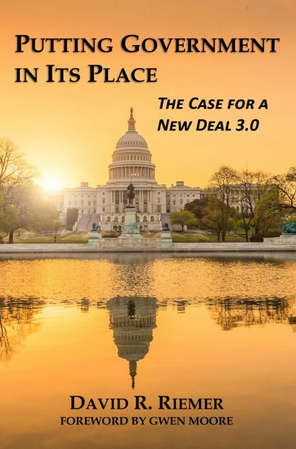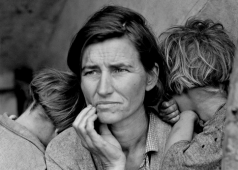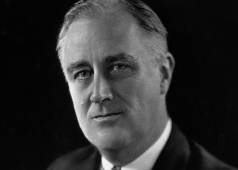Ending Welfare
Once the reforms proposed here virtually end unemployment, poverty, and lack of health insurance, we can eliminate the welfare system.
As the proposed economic security reforms take effect, American adults who can work will always have ready access to wage-paying jobs. Full-time work, in turn, will always guarantee a sufficient income, well above the poverty line.
Adults who cannot work because of a serious disability will equally have an income that exceeds the poverty line. And seniors, who have retired after a working lifetime, will always receive Society Security payments that lift them out of poverty and let them live in comfort.
Everyone will then have the cash they need to buy food at grocery stores--enough food to stock their cupboards and refrigerators. Everyone will have the dollars they need to pay the full monthly rent for their apartments, or the monthly mortgage installments on their homes. Everyone will have sufficient money to pay their utility bills in full in on time; to buy clothing for themselves and their children; and to meet other basic necessities.
Everyone will also have excellent health insurance, regardless of age, income, or job status.
Finally, parents will have the resources, the options, and the accountability they need to provide their children with good childcare and a solid K12 education. And older students who want to go to college will be free to do so, undeterred by high tuition and unencumbered by debt.
With such a comprehensive and improved system of economic security and equal opportunity in place, the U.S. will no longer need welfare programs that require poverty (or "near-poverty") as a precondition of help, impose a stigma, target benefits in ways that encourage fraud and error, and phase out benefits in ways that discourage work and marriage.
Welfare programs--the type of means-tested programs that dole out cash or "cash-substitute" benefits to the poor and near-poor, and that Franklin Roosevelt and the New Dealers once called "relief"--can then be eliminated.
We can repeal TANF. We can end Food Stamps and the food-related part of WIC. We can end LIHEAP. We can get rid of public housing and other housing subsidies.
With everyone enrolled in an excellent health insurance program, it will also be pointless to operate special health insurance programs just for poor people. We can eliminate Medicaid. We can end the health-related part of WIC.
We can do away with all programs that require Americans to be poor to get help.
The creation of a comprehensive and solid system of economic security will allow such a tiny fraction of Americans to “fall through the cracks” that large-scale, means-tested welfare programs—at any level of government—will simply be unnecessary.
FDR urged this change in policy direction in his 1935 State of the Union message. In his address, he urged Congress to create wage-paying public service jobs for 3.5 million unemployed Americans, which became the WPA. He announced his intention to introduce legislation to "provide security against the major hazards and vicissitudes of life" by creating "unemployment insurance and old-age insurance," which Congress enacted a few months later as the Social Security Act. During these years FDR also supported and signed federal laws to create a national minimum wage, and allow labor unions to organize and bargain.
What's typically overlooked is the other part--the anti-welfare part--of FDR's plan. At the same moment that Roosevelt pressed for the WPA and Social Security, he simultaneously pressed for the elimination of poverty-requiring welfare programs: "To dole our relief in this way is to administer a narcotic, a subtle destroyer of the human spirit. It is inimical to the dictates of a sound policy. It is in violation of the traditions of America.... The Federal Government must and shall quit this business of relief." Read More ->
Eighty years later, we should commit to carrying out all of the unfinished business of the New Deal. The cluster of programs that enable Americans to enjoy what FDR called "a proper security, a reasonable leisure, and a decent living throughout life"--i.e., guaranteed Transitional Jobs for the unemployed; a suitable minimum wage (augmented, as we now recognize, by a well-structured earning supplement); and unemployment, disability, and Social Security benefits --should be accompanied by quitting "this business of relief."
The Logic of Universal Policies vs. the Illogic of Means Testing
In addition to getting rid of welfare programs because they are no longer needed, there is another powerful reason for abolishing the welfare system.
The economic security and equal opportunity policies proposed here are universal. They apply equally to the poor, the near-poor, the middle-class, and the wealthy. They rest on the same principle as Worker's Compensation, Unemployment Insurance, Social Security, and Medicare: once you qualify, neither your income, nor your marital status, nor the number of your children alters your eligibility.
By contrast, welfare programs are “means-tested.” They require adults to have no or little “means”—that is, be poor (or nearly so) to get help. They require adults to remain poor (or nearly so) to continue to receive help. Stop being poor or near-poor, and help quickly fades away or falls off a cliff. Welfare traps the poor in poverty.
Welfare's Perverse Incentives
The cruelest feature of the poverty trap is the way means-tested welfare programs create perverse incentives.
To begin with, they entice low-income people to “look poor” — by lying about income, work, or family size—in order to obtain or retain benefits.
Welfare programs also create a perverse incentive to shun work, and to avoid marriage, so that they do not merely "look" poor but indeed remain poor enough to obtain or retain benefits. Welfare programs thus invite many of the poor to compromise their personal or religious values as the price of obtaining help.
A Final Benefit
Once we put in place for all Americans—regardless of income—a comprehensive system of economic security and equal opportunity that permits the repeal of "poverty-requiring" welfare programs, both poverty itself will virtually vanish and the cruel (if unintended) consequences of the welfare system's poverty trap vanish.
There is also a final benefit. The U.S. Constitution enshrines the concept of welfare" as one of America's primary goals. Its preamble--the language that starts with "We, the people of the United States"--explicitly states that one of the new nation's fundamental purposes is "to promote the general welfare."
Sadly, since the New Deal, "welfare" has become a dirty word. It is nearly a synonym for cheating and mooching. Some of those who use the term precede it with racist slurs.
By repealing America's misbegotten, "poverty-requiring" welfare system, we can begin to restore the Constitution's notion of "the general welfare" to the high place in our political and policy discourse where the Founders placed it and it truly belongs.


